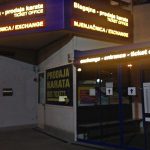Recent changes to the border control regime caused enormous traffic jams at Croatia’s border crossings.
Croatia’s Member of European Parliament Tonino Picula sent a question to the European Commission about the measures it plans to take in order to avoid traffic jams at border crossings that have emerged after the implementation of the regulation tightening controls at external borders, reports tportal.hr on April 10, 2017.
Picula warned that on the very first day of the implementation enormous traffic jams were seen at all border crossings between Croatia and Slovenian due to insufficient capacities of existing technology solutions, said his office in a statement. “On the second day, an agreement was reached on the temporary derogation of the implementation of the new regulation for Croatian border crossings with Slovenia and Hungary, and on the return to the old system of border controls. However, lines were not shortened significantly at border crossings because the countries continued to use different systems of control,” said Picula.
Therefore, he asked the European Commission whether it planned additional investments in technical, technological, administrative and personnel aspects of the border control regime in order to avoid any unnecessary waiting. “No one disputes the political reality of the need to reform the existing border control system, but we must take into account the consequences of stricter controls of passengers at the busiest border crossings, especially during the holiday season,” he said.
MEP Picula worked on the directive as a member of the European Parliament’s Committee on Foreign Affairs. During the debate at a plenary session, he warned that current technologies did not allow for fast enough scanning of biometric data and their verification in existing systems. He also emphasized that there should be no discrimination between member states and that the implementation of border controls should not be misused for political purposes.
After the European Parliament confirmed the Croatian accession to the Schengen Information System (SIS), Picula was appointed as rapporteur on the implementation of the information system. This means that he will closely participate in every step related to the Croatian accession to the Schengen Agreement.








